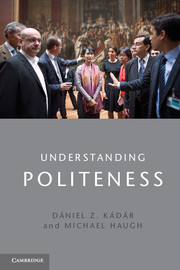Book contents
- Frontmatter
- Contents
- List of figures
- List of tables
- Foreword
- Acknowledgements
- 1 Introduction
- Part I Theoretical framework
- 2 The roots of politeness research
- 3 Recent developments in politeness research
- 4 Politeness as social practice
- 5 Understandings of politeness
- Part II Politeness and time
- Part III Politeness and social space: from mind to society
- Notes
- Glossary
- References
- Index
4 - Politeness as social practice
Published online by Cambridge University Press: 05 June 2014
- Frontmatter
- Contents
- List of figures
- List of tables
- Foreword
- Acknowledgements
- 1 Introduction
- Part I Theoretical framework
- 2 The roots of politeness research
- 3 Recent developments in politeness research
- 4 Politeness as social practice
- 5 Understandings of politeness
- Part II Politeness and time
- Part III Politeness and social space: from mind to society
- Notes
- Glossary
- References
- Index
Summary
Introduction
One of the most important findings in politeness research to date is that politeness does not reside in particular behaviours or linguistic forms, but rather in evaluations of behaviours and linguistic forms. This means that politeness is always situated: in particular institutional, interpersonal or public contexts, in certain interaction types or genres, as well as in particular relational networks. It also means that politeness is crucially dependent on the understanding of the participants themselves. Another key finding has been that evaluations of politeness can vary across individuals, even when they are – at least nominally – from the same social group. This variability, and the moral implications of such evaluations, means that politeness is inherently argumentative. In other words, people don't always agree about what is polite, impolite and so on. And not only that, these evaluations can have significant consequences for the parties involved.
Consider example (1), which is from the movie The Social Network. Mark and Erica have been talking about Mark's ‘obsession’ with getting into a ‘final club’ (i.e. an undergraduate social club) at Harvard University.
- Type
- Chapter
- Information
- Understanding Politeness , pp. 57 - 80Publisher: Cambridge University PressPrint publication year: 2013



